新概念第一册第63课-Lesson-63
新概念第一册课文翻译及知识点【Lesson61、63、65】

【导语】新概念英语作为⼀套世界闻名的英语教程,以其全新的教学理念,有趣的课⽂内容和全⾯的技能训练,深受⼴⼤英语学习者的欢迎和喜爱。
为了⽅便同学们的学习,为⼤家整理了⾯的新概念第⼀册课⽂翻译及学习笔记,希望为⼤家的新概念英语学习提供帮助!Lesson61 【课⽂】 MR. WILLIAMS: Where's Jimmy? MRS. WILLIAMS: He's in bed. MR. WILLIAMS: What's the matter with him? MRS. WILLIAMS: He feels ill. MR. WILLIAMS: He looks ill. MRS. WILLIAMS: We must call the doctor. MR. WILLIAMS: Yes, we must. MR. WILLIAMS: Can you remember the doctor's telephone number? MRS. WILLIAMS: Yes. It's 09754. DOCTOR: Open your mouth, Jimmy. Show me your tongue. Say, "Ah'. MR. WILLIAMS: What's the matter with him, doctor? DOCTOR: He has a bad cold, Mr. Williams, so he must stay in bed for a week. MRS. WILLIAMS: That's good new for Jimmy. DOCTOR: Good news? Why? MR. WILLIAMS: Because he doesn't like school! 【课⽂翻译】 威廉斯先⽣:吉⽶在哪⼉? 威廉斯夫⼈:他躺在床上。
【新概念英语第一册课文】新概念英语第一册第63-64课:Thank you,doctor
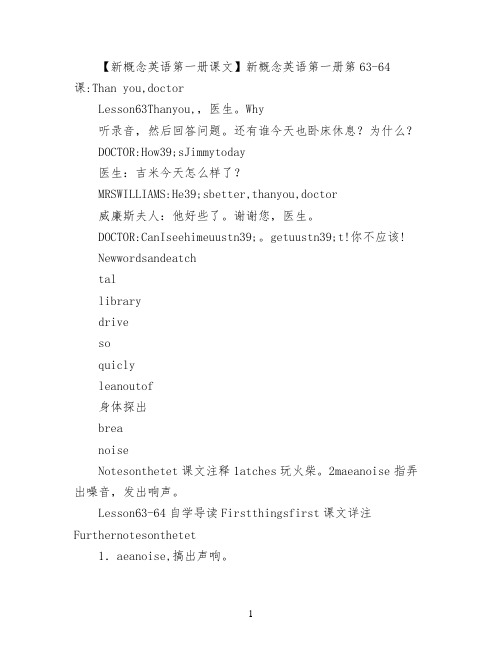
【新概念英语第一册课文】新概念英语第一册第63-64课:Than you,doctorLesson63Thanyou,,医生。
Why听录音,然后回答问题。
还有谁今天也卧床休息?为什么?DOCTOR:How39;sJimmytoday医生:吉米今天怎么样了?MRSWILLIAMS:He39;sbetter,thanyou,doctor威廉斯夫人:他好些了。
谢谢您,医生。
DOCTOR:CanIseehimeuustn39;。
getuustn39;t!你不应该!Newwordsandeatchtallibrarydrivesoquiclyleanoutof身体探出breanoiseNotesonthetet课文注释1atches玩火柴。
2maeanoise指弄出噪音,发出响声。
Lesson63-64自学导读Firstthingsfirst课文详注Furthernotesonthetet1.aeanoise,搞出声响。
noise是抽象名词。
抽象名词是不可数的,前面加不定冠词a 并不意味1、2、3、4等数目,只是赋予那个名词具体的含义,如一次、一种、一例、一番等。
又如:havearest休息一下taealooat看一眼3.leanoutofthewindow,把身子探出窗外。
outof是介词短语,与in或into相对,表示离开、脱离。
语法Grammarinuse禁令don39;t与mustn39;t都可用来表示禁令。
用mustn39;t表示禁止或不许可,语气比较强烈。
例如:Donttaethismedicine!不要吃这个药!Youmustnttaethismedicine!你不许吃这个药!Dontcallthedoctor!不要给大夫打 !Youmustntcallthedoctor!你不许给大夫打 !Donttalinthelibrary!请勿在图书馆交谈!Youmustnttalinthelibrary!你不许在图书馆内交谈!Don39;tleanoutofthewindow!别把头或身子探出窗外!Youmustn39;tleanoutofthewindow!你不许把头或身子探出窗外!词汇学习Wordstudy1.eewarm使房间保持温暖。
新概念第一册63课 PPT课件
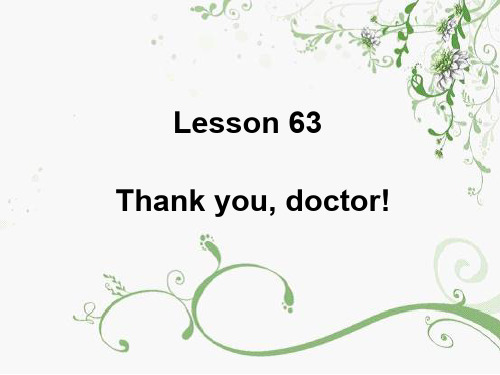
• He can get up for about two hours each day, but you must keep the room warm.
• D:Where's Mr. Williams this evening?
• W:He's in bed, doctor. Can you see him please? He has a bad cold, too!
•
课文讲解
• How is Jimmy today? 吉米今天怎么样了? how 特殊疑问词,怎样 你怎么样?(你好吗?)How are you? 你有多重?How heavy are you? 你感觉如何?How do you feel today?
Modal verb
• Must 是一个表达的情感很强烈的情态动词意思是必须, 应当=have to
• every student (不能写为every of the student) • Every one of my fingers • Every boy loves their school. • Every one works hard in our company.
• Keep sth… Please keep your desk tidy.保持桌面整洁。 Keep the room warm.保持房间温暖。
Completing the text
• D:How's Jimmy today? • W:Better. Thank you,doctor. • D:Can I see him please, Mrs. Williams? • W:Certainly, doctor. Come upstairs. • D:You look very well, Jimmy. • You are better now, but you mustn' t get
最新新概念第一册-Lesson-63-64-课堂及课后练习
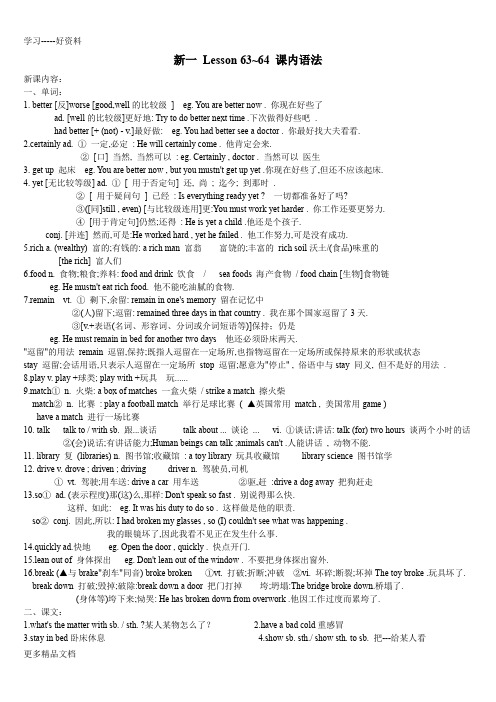
新一Lesson 63~64 课内语法新课内容:一、单词:1. better [反]worse [good,well的比较级] eg. You are better now . 你现在好些了ad. [well的比较级]更好地: Try to do better next time .下次做得好些吧.had better [+ (not) - v.]最好做: eg. You had better see a doctor . 你最好找大夫看看.2.certainly ad. ①一定,必定: He will certainly come . 他肯定会来.②[口] 当然, 当然可以: eg. Certainly , doctor . 当然可以医生3. get up 起床eg. You are better now , but you mustn't get up yet .你现在好些了,但还不应该起床.4. yet [无比较等级] ad. ①[ 用于否定句] 还, 尚; 迄今; 到那时.②[ 用于疑问句] 已经: Is everything ready yet ? 一切都准备好了吗?③([同]still , even) [与比较级连用]更:You must work yet harder . 你工作还要更努力.④[用于肯定句]仍然;还得: He is yet a child .他还是个孩子.conj. [并连] 然而,可是:He worked hard , yet he failed . 他工作努力,可是没有成功.5.rich a. (wealthy) 富的;有钱的: a rich man 富翁富饶的;丰富的rich soil沃土/(食品)味重的[the rich] 富人们6.food n. 食物;粮食;养料: food and drink 饮食/ sea foods 海产食物/ food chain [生物]食物链eg. He mustn't eat rich food. 他不能吃油腻的食物.7.remain vt. ①剩下,余留: remain in one's memory 留在记忆中②(人)留下;逗留: remained three days in that country . 我在那个国家逗留了3天.③[v.+表语(名词、形容词、分词或介词短语等)]保持;仍是eg. He must remain in bed for another two days 他还必须卧床两天."逗留"的用法remain 逗留,保持;既指人逗留在一定场所,也指物逗留在一定场所或保持原来的形状或状态stay 逗留;会话用语,只表示人逗留在一定场所stop 逗留;愿意为"停止" , 俗语中与stay 同义, 但不是好的用法.8.play v. play +球类; play with +玩具玩......9.match①n. 火柴: a box of matches 一盒火柴/ strike a match 擦火柴match②n. 比赛: play a football match 举行足球比赛( ▲英国常用match , 美国常用game )have a match 进行一场比赛10. talk talk to / with sb. 跟...谈话talk about ... 谈论... vi. ①谈话;讲话: talk (for) two hours 谈两个小时的话②(会)说话;有讲话能力;Human beings can talk ;animals can't .人能讲话, 动物不能.11. library 复(libraries) n. 图书馆;收藏馆: a toy library 玩具收藏馆library science 图书馆学12. drive v. drove ; driven ; driving driver n. 驾驶员,司机①vt. 驾驶;用车送: drive a car 用车送②驱,赶:drive a dog away 把狗赶走13.so①ad. (表示程度)那(这)么,那样: Don't speak so fast . 别说得那么快.这样, 如此: eg. It was his duty to do so . 这样做是他的职责.so②conj. 因此,所以: I had broken my glasses , so (I) couldn't see what was happening .我的眼镜坏了,因此我看不见正在发生什么事.14.quickly ad.快地eg. Open the door , quickly . 快点开门.15.lean out of 身体探出eg. Don't lean out of the window . 不要把身体探出窗外.16.break (▲与brake"刹车"同音) broke broken ①vt. 打破;折断;冲破②vi. 坏碎;断裂;坏掉The toy broke .玩具坏了. break down 打破;毁掉;破除:break down a door 把门打掉垮;坍塌:The bridge broke down.桥塌了.(身体等)垮下来;恸哭: He has broken down from overwork .他因工作过度而累垮了.二、课文:1.what's the matter with sb. / sth. ?某人某物怎么了?2.have a bad cold重感冒3.stay in bed卧床休息4.show sb. sth./ show sth. to sb. 把---给某人看更多精品文档5.have a headache/temperature头疼/发烧6.be in bed躺在床上7.feel ill觉得不舒服三、课文详注1.play with, 玩---(东西)The children are playing with a toy car in the garden. 孩子们正在花园玩一辆玩具汽车。
新概念英语第一册课文翻译及学习笔记Lesson63~68

新概念英语第一册课文翻译及学习笔记Lesson63~68【导语】为了方便同学们的学习,为您精心整理了“新概念英语第一册课文翻译及学习笔记Lesson63~68”,希望有了这些内容的帮助,可以为大家学习新概念英语提供帮助!如果您想要了解更多新概念英语的相关内容,就请关注吧!新概念英语第一册课文翻译及学习笔记Lesson63~64 【课文】DOCTOR: How’s Jimmy today?MRS. WILLIAMAS: Better. Thank you, Doctor.DOCTOR: Can I see him please, Mrs. Williams?MRS. WILLIAMS: Certainly, doctor. Come upstairs.DOCTOR: You look very well, Jimmy. You are better now, but you mustn’t get up yet. You must stay in bed for another two days.DOCTOR: The boy mustn’t go to school yet, Mrs. Williams. And he mustn’t eat rich food.MRS. WILLIAMS: Does he have a temperature, doctor?DOCTOR: No, he doesn’t.MRS. WILLIAMS: Must he stay in bed?DOCTOR: Yes. He must remain in bed for another twodays. He can get up for about two hours each day, but you must keep the room warm.DOCTOR: Where’s Mr. Williams this evening?MRS. WILLIAMS: He’s in bed, doctor. Can you see him please? He has a bad cold, too!【课文翻译】医生:吉米今天怎么样了?威廉斯夫人:他好些了。
新概念第一册第 63 课PPT

1.Where is Mr.Williams this evening? He is in bed.
2. How is he?
He has a bad cold, too.
Language Points
Doctor: How's Jimmy today? 注:How is sb? Mrs.Williams: Better. Thank you, doctor. 注:形容词well/good比较级,表达更....
注:keep sth +adj
Thank you!
You must stay in bed for another two days.
1. The boy mustn't go to school yet, yes or no? 2. He mustn't eat rich food, yes or no?
3. Does he have a temperature?
How's Jimmy today?
Better. Thank you. Can the doctor see him ?
Certainly. Come upstairs.
What does the doctor tell Jimmy?
You looked very well, Jimmy.
You are better now, but you mustn't get up yet.
You must stay in bed for another two days.
注:=two more days 另外两天
Hale Waihona Puke Doctor: The boy mustn't go to school yet, Mrs.Williams And he mustn't eat rich food. Mrs.Williams: Does he have a temperature, doctor? Doctor: No, he doesn't. Mrs.Williams: Must he stay in bed? Doctor: Yes. He must remain in bed for another two days. 注:=? He can get up for about two hours each day, 注:each 指两个或两个以上中的每一个,强调逐个,单个 but you must keep the room warm.
新概念第一册Lesson63&64
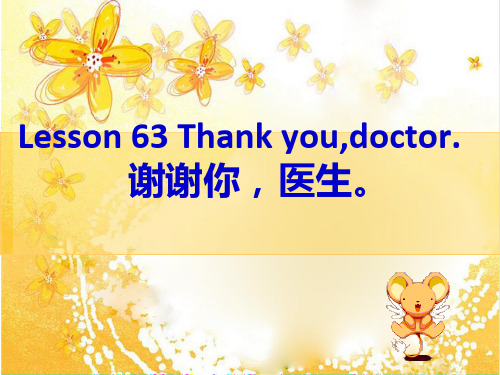
certainly
• adv. 当然 =Of course. =Sure.
rich
• rich adj. 油腻的,富有的 the rich 富人 the poor 穷人 我不喜欢黄油因为它太腻了。 I don’t like butter, because it is too rich.
food
情态动词的否定
• may not 表示“不可以”“不可能”。如: 1.—May I turn the radio on?我可以打开收音机 吗? —No, you may not.不,不可以。 2.She is busy these days. She may not go to the concert tonight. 近来她很忙,今晚她可能不来听 音乐会了。
情态动词的否定
• need not或 needn’t 表示“不必”。如: —Must I finish the work at once?我必须马上完 成这工作吗? —No, you needn’t(don’t have to).不,你不必。
情态动词的否定
• 另外,我们要特别注意“情态动词的否定形式+完 成时”的表达。 can’t have done sth.表示“不大可能做某事”, needn’t have done sth.表示“本来没有必要做某事 但做了”, oughtn’t to或shouldn’t have done sth.表示“本不应 该做某事但做了”。
情态动词的否定
• must not或mustn’t 表示“ 不应该”“不可以”和 “禁止”。如: 1.—May I take this book out of the reading room? 我可以把这本书拿出阅览室吗? —No, you mustn’t. 不,不可以。 2.—Can I park my car here?我可以在这儿停车 吗? —No, cars mustn’t be parked here.不行,这里禁 止停车。
新概念第一册第63课-Lesson-63讲解学习
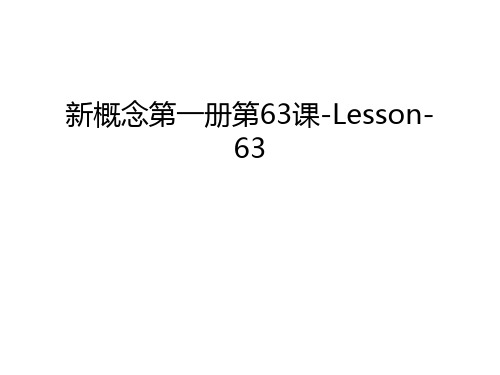
• upstairs 楼上,downstairs 楼下 上楼:come upstairs下楼:go downstairs • look,看起来
• 我可以看看他吗,威廉斯夫人? • 当然可以,医生。上楼吧。 • 你看上去很好,吉米。你现在好些了
• but you mustn't get up yet. You must stay in bed for another two days.
★注意:最高级前要加定冠词the
★certainly adv. 当然 =Of course. =Sure.
eg:May I come in? Certainly./Of course./Sure. 我能进来吗? 当然可以。
★get up 起床
eg:Please get up at five tomorrow. 明天请五点起床。
补充短语:get on 上车 / get off 下车
★yet adv. 还,仍(多用于否定句中) not…yet 还没…
eg:The work is not finished yet. 工作还没完成。
★rich adj. 油腻的,富有的 the rich 富人
eg:I don’t like butter, because it is too rich. 我不喜欢黄油,因为它太腻了。
• Does he have a temperature, doctor?
• go to school去上学 • have a temperature发烧
• 这孩子还不能去上学,威廉斯夫人,而且 不能吃油腻的食物。
• 他还发烧吗,医生?Fra bibliotek• No, he doesn't. • Must he stay in bed? • Yes.He must remain in bed for another two
新概念英语第一册第63-64课听力:Thankyou,doctor
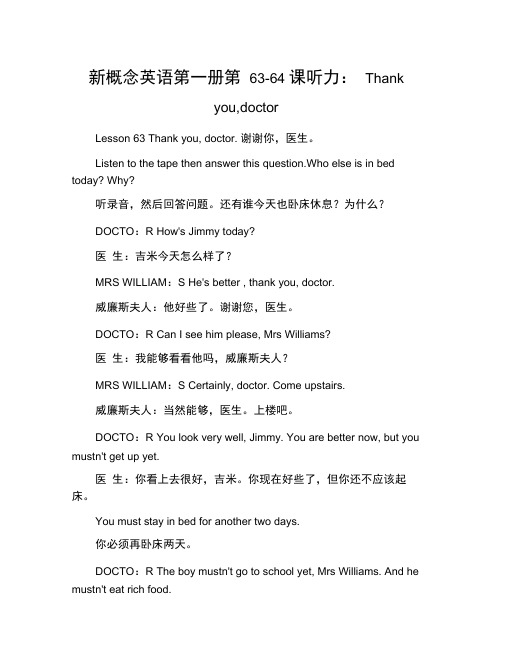
新概念英语第一册第63-64 课听力:Thankyou,doctorLesson 63 Thank you, doctor. 谢谢你,医生。
Listen to the tape then answer this question.Who else is in bed today? Why?听录音,然后回答问题。
还有谁今天也卧床休息?为什么?DOCTO:R How's Jimmy today?医生:吉米今天怎么样了?MRS WILLIAM:S He's better , thank you, doctor.威廉斯夫人:他好些了。
谢谢您,医生。
DOCTO:R Can I see him please, Mrs Williams?医生:我能够看看他吗,威廉斯夫人?MRS WILLIAM:S Certainly, doctor. Come upstairs.威廉斯夫人:当然能够,医生。
上楼吧。
DOCTO:R You look very well, Jimmy. You are better now, but you mustn't get up yet.医生:你看上去很好,吉米。
你现在好些了,但你还不应该起床。
You must stay in bed for another two days.你必须再卧床两天。
DOCTO:R The boy mustn't go to school yet, Mrs Williams. And he mustn't eat rich food.医生:这孩子还不能去上学,威廉斯夫人,而且不能吃油腻的食物。
Mrs Williams :Does he have a temperature, doctor?威廉斯夫人:他还发烧吗,医生?Doctor :No, he doesn 't.医生:不,他不发烧了。
MRS WILLIAM:S Must he stay in bed?威廉斯夫人:他还必须卧床吗?DOCTO:R Yes. He must remain in bed for another two days.医生:是的,他还必须卧床两天。
新概念英语第一册第63课Lesson63课文单词知识点
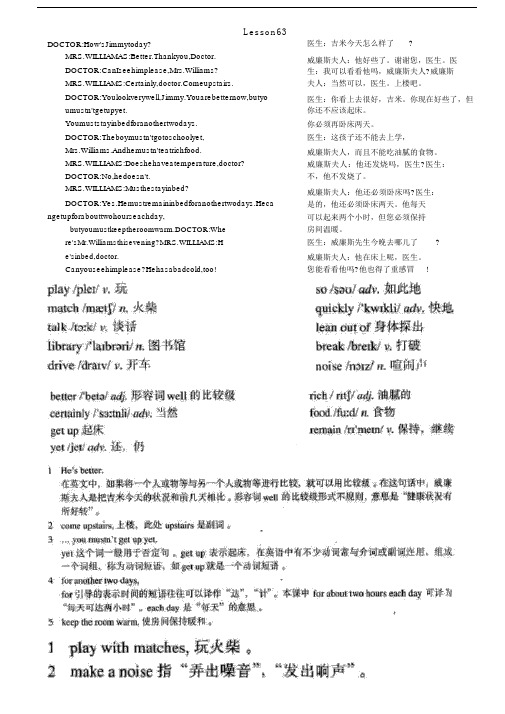
--------- Lesson63DOCTOR:How'sJimmytoday?MRS.WILLIAMAS:Better.Thankyou,Doctor.DOCTOR:CanIseehimplease,Mrs.Williams?MRS.WILLIAMS:Certainly,eupstairs.DOCTOR:Youlookverywell,Jimmy.Youarebetternow,butyoumustn'tgetupyet.Youmuststayinbedforanothertwodays.DOCTOR:Theboymustn'tgotoschoolyet,Mrs.Williams.Andhemustn'teatrichfood.MRS.WILLIAMS:Doeshehaveatemperature,doctor?DOCTOR:No,hedoesn't.MRS.WILLIAMS:Musthestayinbed?DOCTOR:Yes.Hemustremaininbedforanothertwodays.Heca ngetupforabouttwohourseachday,butyoumustkeeptheroomwarm.DOCTOR:Where'sMr.Williamsthisevening?MRS.WILLIAMS:He'sinbed,doctor.Canyouseehimplease?Hehasabadcold,too!医生:吉米今天怎么样了?威廉斯夫人:他好些了。
谢谢您,医生。
医生:我可以看看他吗,威廉斯夫人?威廉斯夫人:当然可以,医生。
上楼吧。
医生:你看上去很好,吉米。
你现在好些了,但你还不应该起床。
你必须再卧床两天。
医生:这孩子还不能去上学,威廉斯夫人,而且不能吃油腻的食物。
威廉斯夫人:他还发烧吗,医生?医生:不,他不发烧了。
威廉斯夫人:他还必须卧床吗?医生:是的,他还必须卧床两天。
新概念英语第一册第62、63、64课课件

dentist 牙医
mumps 腮腺炎
ache 胃痛
Sentence
1.Fell ill(感觉病了) Look ill(看起来病了) ❤自我感觉 ❤外表形象 2. She has a headache ❤类似的ache复合词:earache, toothache~~ 3. Take/have an aspirin. 4. Have a temperature. 发烧 have a bad cold. 感冒
• Match ❤ n. 竞赛。 对手, 敌手。火柴。配对物一对 相配的两个(或两个以上的)人(或物) 。 ❤ v. 使较量, 使比赛;相似;配对;和…不 相上下适应; (使)相配; (使)相称。 例:It's dangerous to play with matches.
The shirt and trousers are a perfect match. They made a good match.
定句,yet常用于否定句和疑问句,但yet还有其 他用法·· ·
Language pointのyet
1.用于否定句中,意思是还、尚、迄今、到那时”。 例: He is not yet here. 他还未到。 At three o’clock they had not yet decided whether to play basketball or not. 三点钟时他们尚未决定是否去打篮球.
Lesson 63
Question
Words
• Better 比较好(形容词well,good的比较 级) • Certainly 当然 =of course. • Get up 起床 =wake up • Rich 油腻的 (富有的→贫困的poor) • Food 食物 (水果:Fruit 蔬菜: Vegetable) • Remain 保持、继续 =Continue
新概念第一册63、64课

• • • • • • • •
6.so:adv.如此地:常常修饰形容词或副词 She is so beautiful that I fall in love with her. Don't speak so fast/quickly, I can't follow you. 7.quickly:副词,形容词quick, It rained so heavily that we ran to the room quickly. 8.lean out of:身体探出 lean:斜靠:lean agains the wall:靠着墙 9.break:动词打破,名词,休息:Let's have a break.=Let's have a rest. • 10.noise:名词,噪音,喧闹声,形容词 • noisy:It is so noisy than I can't fall asleep.
4.for two hours: • for 可译为:达,每天可起来多达两个 小时。
5.every day和each day的区别: • e.g How much fruit do you eat every day? • A blue whale eats four tons of food each day. • 第一句强调的是“频度”,旨在说明 “每天”做的事情;第二句强调的是 “平均每天”,大家可以想到鲸鱼不可 能每天都能捕获4顿食物,所以只能取平 均的数值。
How, be Jimmy? He, better, Come upstairs, see him
You, look very well, You,must not ,get up you,must ,stay in bed, another two days.
新概念英语一册lesson第63-64课完整版知识讲解
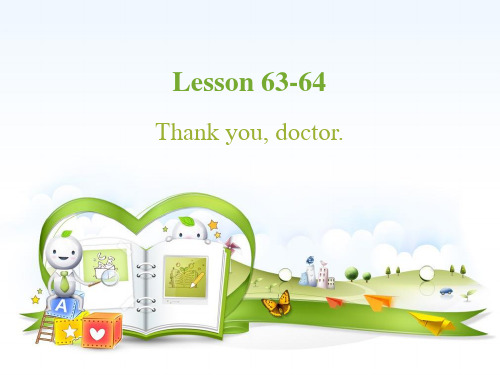
food [ f u: d] things we eat
★remain v. 保持,继续 ① v. 留下;停留 你最好留在家里。 我们将要在罗马再呆两天。
You’d better remain at home. We’re going to remain in Rome for another two days.
② v. 保持不变 在几天内还会很冷。
大多数人在会议上保持沉默。
It will remaiபைடு நூலகம் cold for a couple of days.
Most people remained silent at the meeting.
remain [ ri‘mein ] 保持 Can you remain _____ for ten seconds? silent
……怎么了?出什么问题了? What’s wrong with you? 出什么事了?你怎么了? 2. Are you OK/fine there? Everything is fine.
3. Do you have an extra pen? Mine broken. Can you lend your pen to me? Could you lend me your pen? I can’t find mine.
2. Every 指三个或三个以上的每一个。 它只能做形容词
every student (不能写为every of the student) Every one of my fingers Every boy loves their school. Every one works hard in our company.
新概念第63课 Lesson63(共14页)

As soon as he had finished, Jenny told him she wanted to go home. Jeremy was a little disappointed by this but he did as his daughter asked. embarrassed
Jeremy Hampden has a large circle of friends and is very popular at parties. Everybody admires him for his great sense of humor -everybody, that is, except his six-year-old daughter, Jenny
•杰里米.汉普登交际甚 广,是各种聚会上深受 大家欢迎的人。人人都 钦佩他那绝妙的幽默感
他认真准备了讲稿,带着 珍妮一道去参加了婚礼
•最近,杰里米的一个最 亲密的朋友请他在一个 婚礼上祝词。这正是杰 里米喜欢做的事情。
•他刚一讲完,珍妮就对 他说她要回家。
On the way home, he asked Jenny if she had enjoyed the speech. To his sJeremy asked her why this was so and she told him that she did not like to see so many people laughing at him!
Lesson 63 She was not amused
admire v 赞美 钦佩 赞美, admire sb for sth :
I admire him for his richness/knowledge.
- 1、下载文档前请自行甄别文档内容的完整性,平台不提供额外的编辑、内容补充、找答案等附加服务。
- 2、"仅部分预览"的文档,不可在线预览部分如存在完整性等问题,可反馈申请退款(可完整预览的文档不适用该条件!)。
- 3、如文档侵犯您的权益,请联系客服反馈,我们会尽快为您处理(人工客服工作时间:9:00-18:30)。
go to school去上学 have a temperature发烧
这孩子还不能去上学,威廉斯夫人,而且 不能吃油腻的食物。
他还发烧吗,医生?
No, he doesn't. Must he stay in bed? Yes.He must remain in bed for another
get up起床 about大概 each day每天/each hour每小时… keep保持,后跟形容词,保持……(某种
状态),warm温暖的
他每天可以起来两个小时,但您必须保持 房间温暖。
Where's Mr. Williams this evening? He's in bed, doctor. Can you see him
mustn't是must的否定式,表示不能…… yet用于否定句句末,仍然 stay in bed,卧床 for表示时间的持续,another,另外…
但你还不应该起床。你必须再卧床两天。
The boy mustn't go to school yet, Mr. Williams.And he mustn't eat rich food.
please?He has a bad cold, too!
where's=where is,在哪里 he's=he is,in bed,卧床 has a bad cold得了重感冒,has是have的
单三形式
威廉斯先生今晚去哪儿了? 他在床上呢,医生。您能看看他吗?他也
得了重感冒!
★remain v. 保持,继续
remain+介词+地点,留在某处 eg:You should remain at home.
你应该待在家里。
remain+形容词,保持……(某种状态) eg:It will remain cold for some days.
这几天还会很冷。
Text 课文
How's Jimmy today? Better. Thank you, Doctor. Can I see him please,Mrs. Williams?
two days.
stay in bed=remain in bed卧床
不,他不发烧了。 他还必须卧床吗? 是的,他还必须卧床两天。
He can get up for about two hours each day, but you must keep the room
warm.
Lesson 63
Thank you, doctor!
单词
better certainly get up yet rich food remain
adj. 形容词well的比较级 adv. 当然
起床 adv. 还,仍 adj. 油腻的,富有的 n. 食物 v. well的比较级 good/well —> better —> best 好—>比较好—>最好
eg:I feel better.我感觉好些了 She is the best student in her class. 她是他们班最好的学生。
★注意:最高级前要加定冠词the
now.
upstairs 楼上,downstairs 楼下 上楼:come upstairs下楼:go downstairs look,看起来
我可以看看他吗,威廉斯夫人? 当然可以,医生。上楼吧。 你看上去很好,吉米。你现在好些了
but you mustn't get up yet. You must stay in bed for another two days.
谢谢观赏
——by Miss Liu
How,怎么样,How are you today?你怎么 样,你好吗?
better=he is better
吉米今天怎么样了? 他好些了。谢谢您,医生。 我可以看看他吗,威廉斯夫人?
Certainly, e upstairs. You look very well, Jimmy. You are better
补充短语:get on 上车 / get off 下车
★yet adv. 还,仍(多用于否定句中) not…yet 还没…
eg:The work is not finished yet. 工作还没完成。
★rich adj. 油腻的,富有的 the rich 富人
eg:I don’t like butter, because it is too rich. 我不喜欢黄油,因为它太腻了。
★certainly adv. 当然 =Of course. =Sure.
eg:May I come in? Certainly./Of course./Sure. 我能进来吗? 当然可以。
★get up 起床
eg:Please get up at five tomorrow. 明天请五点起床。
